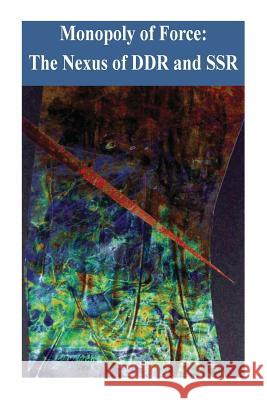Monopoly of Force: The Nexus of DDR and SSR » książka
Monopoly of Force: The Nexus of DDR and SSR
ISBN-13: 9781502577931 / Angielski / Miękka / 2014 / 332 str.
In the immediate aftermath of war or in the midst of violent conflict, there is everything to be done. The urgency of anything can be overwhelming and can lead to paralysis. Sequencing and prioritizing seem unrealistic luxuries, and confusion often reigns. Studies show that of the countries emerging from conflict, 40 percent return to it within 10 years. Indeed, immediate past conflict is the single most highly correlated predictive factor for future conflict. When the window for peace consolidation opens, robust efforts must be directed toward reinforcing and broadening the peace to ensure that combatants do not return to arms; the window shuts all too rapidly. The time frame for consolidating peace is compressed. This will often-perhaps inevitably-require some extremely difficult decisions, choices, and compromises. However, if human life is to be protected, certain important public goods may have to be deferred to ensure against a rapid return to violence. In the "golden moment" when recent belligerents have agreed on peace terms-before the ensuing enthusiasm has dissipated-there is often a multitude of donors, sponsors, and other benefactors ready to help. This is both a blessing and a curse. The blessing is in the resources, both human and capital, brought to the peace consolidation process. The curse comes in the form of the multiple agents offering those resources and their expertise, each with its own agenda, objectives, expectations, and methods. The topography of peace can be crowded, confused, and conflicted. Writings on complex operations, development, and peace-building are permeated by optimism and a can-do attitude. All problems can be solved if only the right techniques are applied and the "political will" is present. Indeed, it is tempting to suppose that all good things go together. In the high-pressure environment of complex operations, we want to believe that with enough consultation and coordination, all efforts to establish equitable and durable peace can be harmonized and deconflicted. Unity of command and unity of effort will ensure that all parts contribute optimally to the shared ultimate objective. As comforting as this vision might be, it is not plausible, and even agendas with similar ultimate goals (such as durable peace) may have conflicting intermediate objectives. In his classic formula, Max Weber distinguished the state as an institution by its monopoly of the legitimate use of force. Although the state may delegate the legitimate use of force, it remains the unique owner of that prerogative. Other institutions, agencies, or elements within society may exercise force, but without delegation from the state, any such exercise is unsanctioned and is thus illegitimate. In reality, no modern state, strong or weak, has an absolute monopoly on the use of force; however, the legitimacy of the use of force is central to the modern concept of governance. Today, many states are threatened by the loss of the monopoly of force and its legitimate use.
Zawartość książki może nie spełniać oczekiwań – reklamacje nie obejmują treści, która mogła nie być redakcyjnie ani merytorycznie opracowana.











